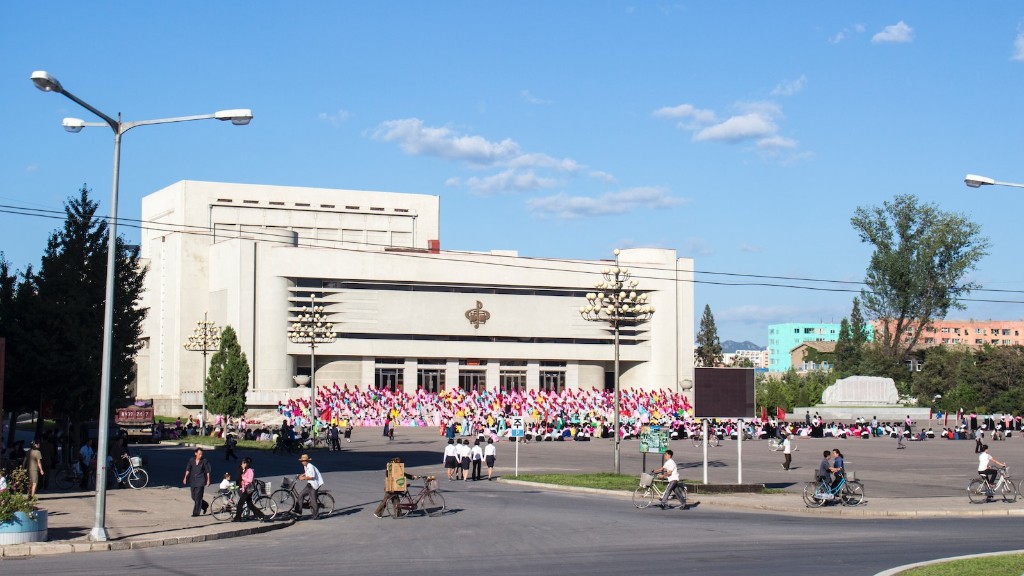It is no surprise that cybersecurity is one of the most pressing issues facing the world today. Now more than ever, individuals, organizations, and governments are vulnerable to cyberattacks. In 2014, North Korea made headlines for their cyberattack on Sony Pictures, a major Hollywood film studio. This attack, which has come to be known as the Sony Hack, serves as a prime example of the damage that can be done through cyberattacks.
The Sony Hack was a cyberattack on the networks of Sony Pictures Entertainment, a major American film and television company. The attack was discovered in November 2014 and caused the company major financial losses and the release of confidential information. It has been speculated that North Korean hackers were responsible for the attack and the US government has officially accused North Korea of the attack.
It has been suggested that North Korea was motivated to launch the attack against Sony in response to the film “The Interview.” This film, starring Seth Rogen and James Franco, was about a plot to assassinate the North Korean leader Kim Jong-Un and was highly controversial. North Korea publicly denounced the movie prior to its release, further fuelling speculation that the country was behind the attack.
The attack on Sony Pictures was highly sophisticated, involving malicious malware and the theft of confidential data. It caused significant disruption to Sony Pictures’ operations, costing the company millions of dollars. Beyond just financial losses, the attack resulted in the release of internal emails and other confidential information, damaging the company’s reputation.
There have been different opinions on the Sony Hack and its implications, both from experts and the public. Some have argued that it is a sign of North Korea’s increasing aggression, while others view it as a sign of the country’s increasing technological advancement. While many have condemned North Korea for the attack, some have argued that it is a sign of desperation and frustration on the part of the North Korean government. Regardless of opinion, the attack on Sony has raised fears of a future where cyberattacks become more widespread and powerful.
Consequences of the Hack
The attack on Sony Pictures had significant consequences for the company, both in terms of financial losses and damage to its reputation. In addition to the millions of dollars in financial losses, the hack was seen as an attack on freedom of expression, as it targeted a critical movie about the North Korean regime.
The attack also had consequences for the cybersecurity industry. It was seen as a major wakeup call for companies to improve their cyber security measures. Since then, many companies have invested in better cyber security measures, in order to protect their networks from such attacks.
In addition, the attack has also had implications for US-North Korea relations. The US government has accused North Korea of the attack and imposed additional economic sanctions against the country. It remains to be seen how these sanctions will affect the already strained relationship between the two countries.
International Response to the Hack
The international community has responded with condemnation of North Korea’s actions. Many organizations, including the United Nations, called for North Korea to be held accountable for the attack. In addition, several countries have imposed sanctions on North Korea in response to the attack, in an effort to deter similar actions in the future.
The attack has also prompted calls for increased cooperation between countries in tackling cyberattacks. It has highlighted the need for greater international collaboration in order to protect against cyberattacks, and this has seen countries such as China and the US sign agreements to cooperate on cyber security issues.
At the same time, it has also led to calls for tighter regulations in the cybersecurity world. Companies have been urged to increase their defences against cyberattacks, and governments have been asked to establish better laws and regulations for addressing such attacks.
Technology Used in the Hack
The Sony Hack involved the use of several sophisticated technologies. Specifically, the hackers used a program known as ‘Wiper’, a type of malicious software that was designed to erase data from computer systems. The program was tailored to erase only certain types of files, allowing the hackers to selectively target certain data.
In addition to Wiper, the hackers also used a tool known as ‘Destover’, which was designed to spread the attack to other computers on a network. In addition, the hackers also used a network of computers located around the world to launch the attack, allowing them to hide their identity.
It is clear that the Sony Hack was a sophisticated attack, involving the use of sophisticated technological tools. This has caused alarm among cyber security experts and has raised the question of how to prevent such attacks in the future.
Preventing Future Cyber-Attacks
The Sony Hack has led to increased discussion on how to better protect against cyber-attacks. The attack highlighted the vulnerability of companies and organizations to cyber-attacks, and prompted calls for stronger cyber-security measures. Companies have been advised to invest in better technologies for detecting and preventing such attacks, and governments have been asked to develop better laws and regulations for tackling cyber-attacks.
Cyber-security experts have suggested adopting a ‘layered’ approach to cyber-security, with multiple layers of security measures in place to protect against various types of cyber-attacks. This includes the use of anti-virus software, firewalls, encryption, and other measures. Companies have also been advised to regularly monitor their networks for any suspicious activity, and to update their systems regularly with the latest security patches.
In addition, there have been calls for increased cooperation between countries in tackling cyber-attacks. Companies have been urged to share information with one another in order to better protect against future cyber-attacks. It is only through improved worldwide cooperation that the impacts of future cyber-attacks can be minimized.
Conclusion of the Hack
The Sony Hack was a highly sophisticated cyberattack that had significant implications for Sony Pictures and the cybersecurity industry as a whole. It caused significant financial losses and the release of confidential information, and raised fears of future cyberattacks. The attack also had international repercussions, with the US government accusing North Korea of being behind the attack and imposing additional sanctions on the country.
The attack has led to increased discussion about cybersecurity and the need for better protection against cyberattacks. Companies have been advised to invest in better technologies for detecting and preventing such attacks, and governments have been urged to develop better laws and regulations for tackling cyberattacks. It is only through improved worldwide cooperation that the impacts of future cyberattacks can be minimized.




